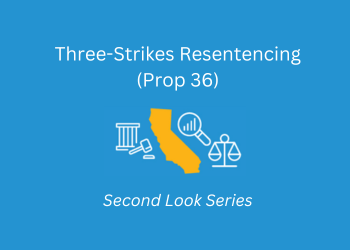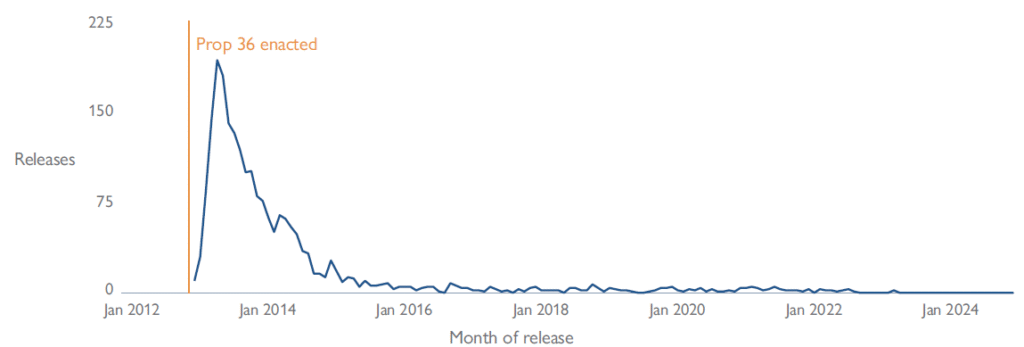- By:
- Category: Criminal justice

POLICY BRIEF: Three Strikes Resentencing under Proposition 36 (2012) ![]()
Note: This brief is part of the Second Look Research Series.
California’s Three Strikes sentencing law lengthens prison sentences based on an individual’s prior convictions, specifically adding a “strike” for each prior “serious” or “violent” felony. Under the original law, a person with two prior strikes who was convicted of any third felony — regardless of whether it was serious or violent — faced a mandatory sentence of 25 years to life. This approach led to lengthy sentences for individuals whose third offense was neither serious nor violent, prompting concern about fairness and over-incarceration. In response, voters passed Proposition 36 in 2012, which generally limits the 25-years-to-life sentence to cases in which the third felony is also serious or violent.
Although Prop 36 did not change the rule that a second strike results in a doubled sentence, it created a resentencing pathway for people serving third-strike life sentences for non-serious, non-violent offenses. Individuals that met the new criteria could petition the court for a reduced sentence, helping align past sentences with current sentencing standards.
This brief examines who was resentenced under Prop 36, the offenses for which they were originally convicted, and their recidivism rates following release.
Second Look Research Series
The policy briefs focus on specific reforms:
Key Findings
1. More than 2,200 people were resentenced and released earlier due to changes in California’s Three-Strikes sentencing. There were 2,217 people incarcerated in California’s prisons for a non-serious, non-violent third-strike that were released earlier after Prop 36 prohibited the application of a 25-year-to-life sentence for these offenses and allowed people already incarcerated with this sentence to apply for resentencing.
Monthly releases of individuals resentenced under Prop 36

Source: California Department of Corrections and Rehabilitation (2013–24).
2. People released under Prop 36 were largely Black and aged 50 or older at the time of release. Almost half (46%) of those released under Prop 36 were Black — compared to approximately 6% of California’s resident population and 24% of people released from prison in fiscal year 2018-19. Over two-thirds were 50 years old or older at release and 59% spent more than 15 years in prison.
3. Three-year recidivism rates for people released due to Prop 36 resentencing were lower than the total release population. Twenty-five percent of people released under Prop 36 were convicted of a new offense within three years, and nearly two-thirds of those convictions were for misdemeanors. In comparison, 42% of total releases were convicted of a new offense within three years, and 26% were misdemeanors.
Background: This research is made possible through a partnership between the California Policy Lab at the University of California and the Committee on Revision of the Penal Code, a state agency that studies and makes recommendations to improve California’s criminal legal system.
Suggested Citation: Skog, A., Lacoe, J. (2025). Three Strikes Resentencing under Proposition 36 (2012). California Policy Lab, University of California. https://capolicylab.org/three-strikes-resentencing-under-proposition-36/
